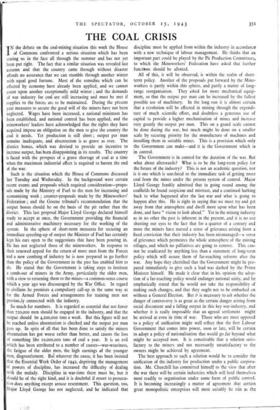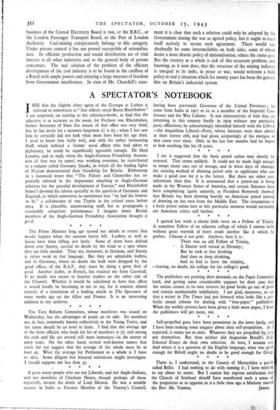THE COAL CRISIS I the debate on the coal-mining situation this
week the House 1 of Commons confronted a serious situation which has been staring us in the face all through the summer and has not yet been put right. The fact that a similar situation was revealed last autumn and that the country came through without disaster affords no assurance that we can stumble through another winter with equal good fortune. Most of the remedies which can be effected by economy have already been applied, and we cannot count upon another exceptionally mild winter ; and the demands of war industry for coal are still increasing and must be met if supplies to the forces are to be maintained. During the pfesent year measures to secure the good will of the miners have not been neglected. Wages have been increased, a national minimum has been established, and national control has been applied, and the mineworkers' leaders have acknowledged that the rights they have acquired impose an obligation on the men to give the country the coal it needs. Yet production is still short ; output per man remains inadequate, and absenteeism is as grave as ever. The district bonus, which was devised to provide an incentive to increase output, has been disappointing in its results. The country is faced with the prospect of a grave shortage of coal at a time when the maximum industrial effort is required to hasten the end of the war.
Such is the situation which the House of Commons discussed last Tuesday and Wednesday. In the background were certain recent events and proposals which required consideration—propo- sals made by the Ministry of Fuel to the men for increasing and economising work ; counter-proposals made by the Mineworkers' Federation ; and the Greene tribunal's recommendation that the output bonus should be on the basis of the pit rather than the district. This last proposal Major Lloyd George declared himself ready to accept at once, the Government providing the financial and administrative machinery necessary for the working of the system. In the sphere of short-term measures for securing an immediate speeding-up of output the Minister of Fuel has certainly kept his ears open to the suggestions that have been pouring in. He has not neglected those of the mineworkers. In response to their renewed appeal for the return of more men from the Forces and a new combing of industry he is now prepared to go further than the policy of the Government in the past has enabled him to do. He stated that the Government is taking steps to institute a comb-out of miners in the Army, particularly the older men, with a view to returning them to the mines—a common-sense course which a year ago was discouraged by the War Office. In regard to civilians he promises a compulsorf call-up in the same way as for the Armed Forces and arrangements for training men not previou,,ly connected with the industry.
So much for numbers. It is regarded as essential that not fewer than 720,000 men should be engaged in the industry, and that the output should be 4,200,000 tons a week. But this figure will not be reached unless absenteeism is checked, and the output per man goes up. In spite of all that has been done to satisfy the miners absenteeism has got worse rather than better, and causes the loss of something like ropoo,000 tons of coal a year. It is an evil which has been attributed to a number of causes—war-weariness, the fatigue of the older men, the high earnings of the younger men, disgruntlement. Bui whatever the cause, it has been insisted that the Essential Work Order of 1942, depriving the management of powers of discipline, has increased the difficulty of dealing with the malady. Discipline in war-time there must be, but it should be of the right kind, and it is doubtful if resort to prosecu- tion does anything except arouse resentment. This question, too, Major Lloyd George has not neglected, and he indicated that discipline must be applied from within the industry in accordance. with a new technique of labour management. He thinks that an important part could be played by the Pit Production Committees, to which the Mineworkers' Federation have asked that further functions should be allotted.
All of this, it will be observed, is within the realm of short- term policy. Another of the proposals put forward by the Mine- workers is partly within this sphere, and partly a matter of long- range reorganisation. They asked for more mechanical equip- ment, so that the output per man can be increased by the fullest possible use of machinery. In the long run it is almost certain that a revolution will be effected in mining through the expendi- ture of much scientific effort, and doubtless a generous use of capital to provide a higher mechanisation of mines and increase very greatly the output per man. This on a grand scale cannot be done during the war, but much might be done on a smaller scale by securing priority for the manufacture of machines and installing them in suitable mines. This is a provision which only the Government can make—and it is the Government which is in control.
The Government is in control for the duration of the war. But what about afterwards? What is to be the long-term policy for the future of the industry? This is not an academic question, nor is it one which is unrelated to the immediate task of getting more coal from the mines under the present system of control. Major Lloyd George frankly admitted that in going round among the coalfields he found suspicion and mistrust, and a continual harking back to what happened after the last war and what is going to happen after this. He is right in saying that we must try and get away from that atmosphere and dwell more upon what has been done, and have " vision to look ahead." Yet in the mining industry as in no other the past is inherent in the present, and it is no use shutting our eyes to the fact that for a quarter of a century and more the miners have nursed a sense of grievance arising from a fixed conviction that their industry has been mismanaged—a sense of grievance which permeates the whole atmosphere of the mining villages, and which no palliatives are going to remove. This can- not be eradicated by anything less than a statement of long-term policy which will assure them of far-reaching reforms after the war. Any hope they cherished that the Government might be pre- pared immediately to give such a lead was dashed by the Prime Minister himself. He made it clear that in his opinion the adop- tion of a far-reaching policy would endanger national unity, and he emphatically stated that he would not take the responsibility of making such changes, and that they ought not to be embarked on without a General Election. But it is necessary to ask whether the danger of controversy is as great as the certain danger arising from social discontent and a falling output in this key war-industry, and whether it is really impossible that an agreed settlement might be arrived at even in time of war. Those who are most opposed to a policy of unification might well reflect that the first Labour Government that comes into power, soon or late, will be certain to adopt a policy of nationalisation that would go .far beyond what might be accepted now. It is conceivable that a solution satis- factory to the miners and not necessarily unsatisfactory to the owners might be achieved by agreement.
The best approach to such a solution would be to consider the unification of the industry for production under a public corpora- tion. Mr. Churchill has committed himself to the view that after the war there will be certain industries which will lend themselves most readily to organisation under some form of public control. It is becoming increasingly a matter of agreement that certain great monopolistic enterprises will most suitably be rtin as the business of the Central Electricity Board is run, or the B.B.C., or the London Passenger Transport Board, or the Port of London Authority. Coal-mining conspicuously belongs to this category. Under private control it has not proved susceptible of rationalisa- tion. Its efficient production and sound distribution are of vital interest to all other industries and to the general body of private consumers. The real solution of the problem of the efficient development of the coal industry is to be found in the creation of a Board with ample powers and enjoying a large measure of freedom from Government interference. In view of Mr. Churchill's state- ment it is clear that such a solution could only be adopted by the Government during the war as agreed policy, but it ought to exert itself actively to secure such agreement. There would un- doubtedly be some irreconcilables on both sides, some of whom desire a more drastic policy of nhtionalisation, others the status quo. But the country as a whole is sick-of this recurrent problem, and knowing, as it now does, that the structure of the mining industry is unequal to its tasks, in peace or war, would welcome a bold policy to end a situation which for twenty years has been the gravest blot on Britain's industrial system..



























 Previous page
Previous page